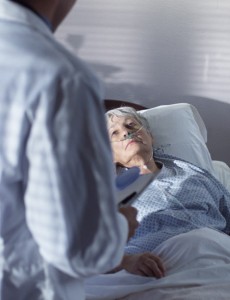As a New Jersey and Philadelphia nursing home abuse lawfirm, many people come to us after their loved ones have developed bedsores while residents at a nursing home or an assisted care facility.
Nursing Home Abuse and Bedsores
Medically speaking, a bedsore is more accurately referred to as a pressure sore or pressure ulcer.  The Mayo Clinic defines these as areas of damaged or dying tissue in skin that results when pressure restricts or cuts off the blood supply to vulnerable parts of a patient’s body such as the skin of the buttocks, the lower back, the hips, the heels, and the toes. If blood flow is compromised and there is not adequate oxygen from the compromised blood flow, the skin and tissue in this area ulcerates and eventually dies resulting in a bedsore. Bedsores can be superficial or they can be gaping wounds that go to the bone.
The Mayo Clinic defines these as areas of damaged or dying tissue in skin that results when pressure restricts or cuts off the blood supply to vulnerable parts of a patient’s body such as the skin of the buttocks, the lower back, the hips, the heels, and the toes. If blood flow is compromised and there is not adequate oxygen from the compromised blood flow, the skin and tissue in this area ulcerates and eventually dies resulting in a bedsore. Bedsores can be superficial or they can be gaping wounds that go to the bone.
Bedsores are a huge risk when living in a nursing home. Research shows from 5 to almost 30% of patients in nursing homes and assisted care living facilities may have bedsores. That’s just an amazing statistic given the numbers of seniors living in nursing homes and assisted living facilities. Without question, bad nursing homes will cause bedsores and pressure ulcers.
How does Nursing Home Abuse Cause Bedsores?
Why are patients in nursing homes much more likely to develop a bedsore than patients who are hospitalized or remain at home? The answer is simple. Because many Corporate Nursing homes put their shareholder’s profit over the very people they are supposed to be providing care for. How?
1. By hiring the lowest paid caregivers who, many times, are inexperienced and do not have adequate training; and
2. By also cutting back on a number of staff members who provide care.
Although laws require nursing homes to provide an adequate number of staff members to provide for the needs of the nursing home patients, many nursing homes or long term care facilities only hire the minimum number of staff required by state law where they are operating. This number is not related to patient needs, but just enough to meet state requirement. That’s like bragging about getting a D on an exam – it may meet the minimum standards, but it’s not good.
Nursing Home Abuse Prevention
Because being in a nursing home is one of the most significant risk factors in whether or not your loved one will or will not develop a bed sore, it is important that families be proactive with nursing homes and become a “patient advocate.” It takes a team effort to fight back against nursing home abuse. If possible, family members should visit their loved one on a daily basis and come at different times to ensure that the nursing staff is not just giving “face time” when they know family members will be present. Family members should do skin checks of their loved ones to see whether or not there is any redness or swelling which could be indicative of a developing pressure ulcer. Families should immediately, in writing, document any signs or symptoms of pressure ulcers. A copy of the documentation should be given to the nurse, the nursing home administrator, and the nursing home physician. Families should demand that the nursing home provide a care plan to address any potential bedsore. If the nursing home does not respond immediately to a potential developing pressure ulcer or bedsore, you should report this nursing home abuse to the ombudsman in your area.
Nursing Home Abuse Lawyers in NJ and PA
If your loved one is receiving inadequate, abusive, or negligent care at a nursing home or long term care facility, contact the Mininno Law Office for a free case evaluation. The nursing home abuse lawyers at the Mininno Law Office are skilled in handling these cases, and earning victims and their families fair and necessary compensation. You may also call for a free consultation at (856) 833-0600 in New Jersey, or (215) 567-2380 in Philadelphia.
Report Nursing Home Abuse in New Jersey
Report Nursing Home Abuse in Pennsylvania

 As New Jersey and Philadelphia nursing home abuse lawyers, we hear from nursing home patients and their families that nursing home staff members do not change the bedding or sheets on a regular basis and, in particular, do not change the nursing home sheets when they become wet.
As New Jersey and Philadelphia nursing home abuse lawyers, we hear from nursing home patients and their families that nursing home staff members do not change the bedding or sheets on a regular basis and, in particular, do not change the nursing home sheets when they become wet. 

 By definition, an ombudsman is a government official who hears and investigates complaints by private citizens against other officials or government agencies.
By definition, an ombudsman is a government official who hears and investigates complaints by private citizens against other officials or government agencies.